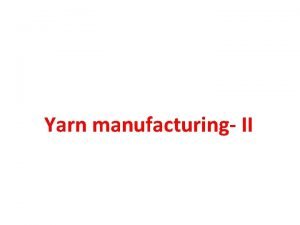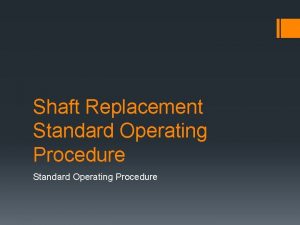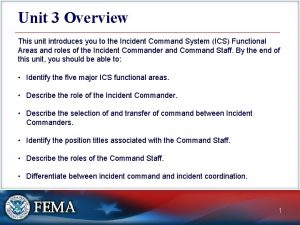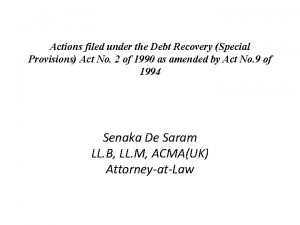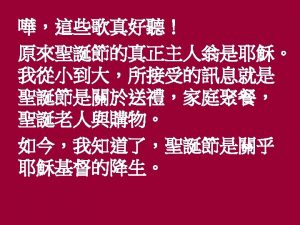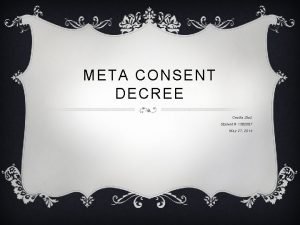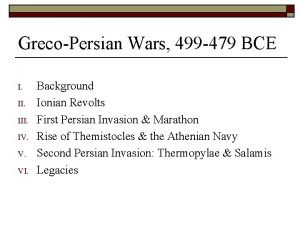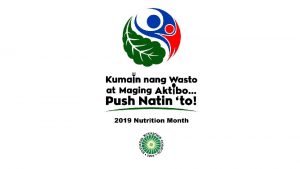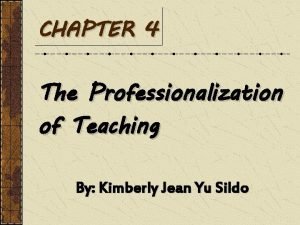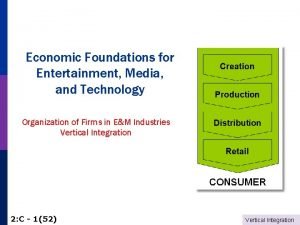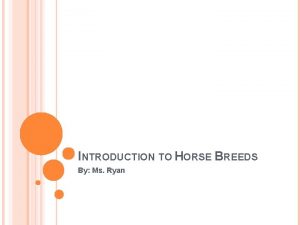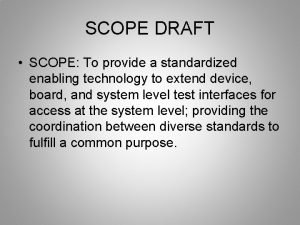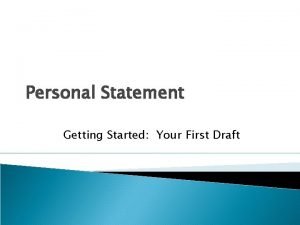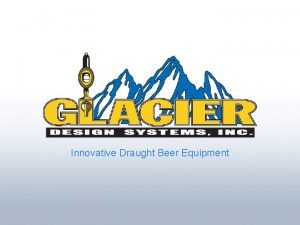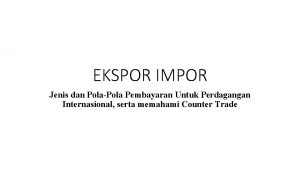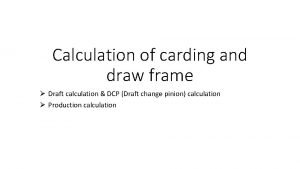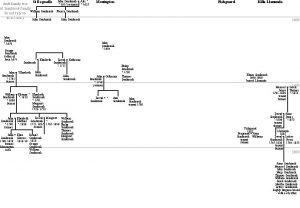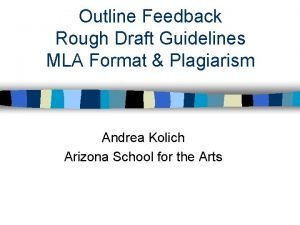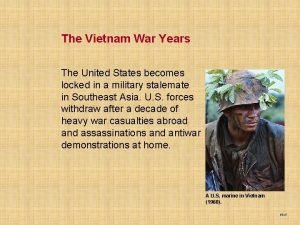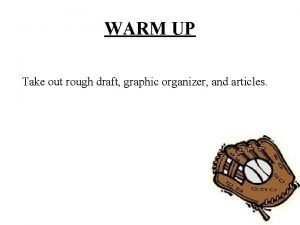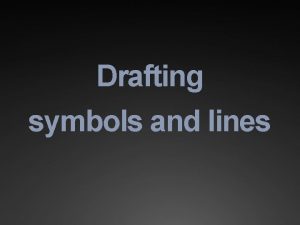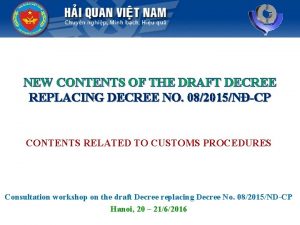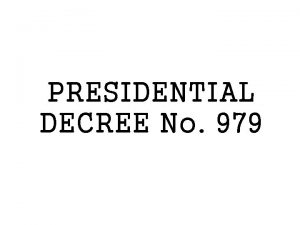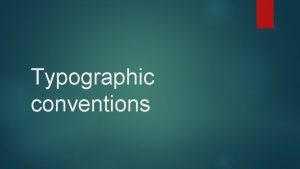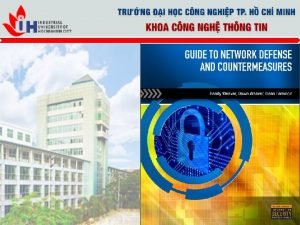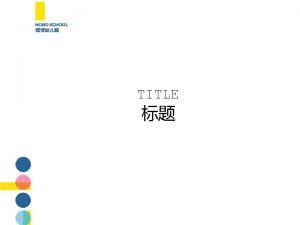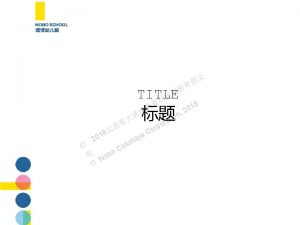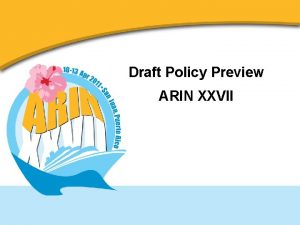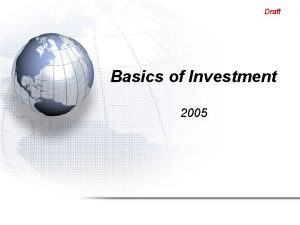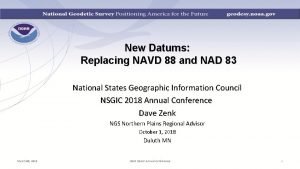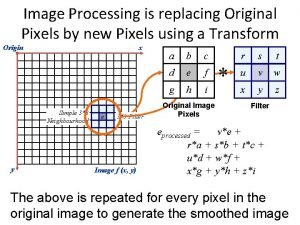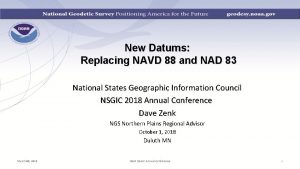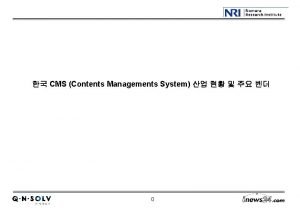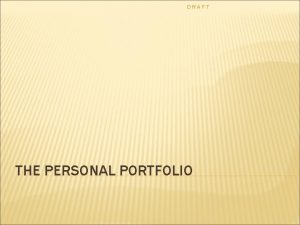NEW CONTENTS OF THE DRAFT DECREE REPLACING DECREE












































































- Slides: 76

NEW CONTENTS OF THE DRAFT DECREE REPLACING DECREE NO. 08/2015/NĐ-CP CONTENTS RELATED TO CUSTOMS PROCEDURES Consultation workshop on the draft Decree replacing Decree No. 08/2015/ND-CP Hanoi, 20 – 21/6/2016

STRUCTURE Part I. Overview of the draft Decree Part II. Introduction of new contents of the draft Decree related to customs procedures Part III. Discussion and collection of comments

OVERVIEW OF THE DRAFT DECREE REPLACEING DECREE NO. 08/2015/ND-CP

NECESSITY OF THE DRAFT DECREE - Implementation of the Law on Laws 2015 Administrative procedures are detailed by Decree. - Guidelines for the Import-Export Duty Law 2016 The Import-Export Duty Law shall take effect on 1 September 2016 - Implementation of Resolution No. 19/2016/NQ-CP To implement measures for improving the business environment, increasing the national competitiveness, which has been assigned by the Government to the Ministry of Finance (General Department of Vietnam Customs)

PRINCIPLES FOR DEVELOPING THE DRAFT DECREE 1. Retain regulations in Decree No. 08/2015/ND-CP which are well implemented; 2. Upgrade administrative procedures in circulars providing for customs procedures which are well implemented: - Circular 38/2015/TT-BTC; - Circular 42/2015/TT-BTC (outgoing and incoming vehicles) (means of transport on entry and exit); - Circular 72/2015/TT-BTC (prioritized enterprises); - Circular No. 20/2014/TT-BTC (vehicle importation of repatriated Vietnamese overseas); - Circular No. 143/2015/TT-BTC (importation of automobiles and motorcycles for non-commercial purposes); - Decision No. 53/2013/QD-TTg (imported and temporarily imported goods of entities entitled to diplomatic privileges and immunities)

PRINCIPLES FOR DEVELOPING THE DRAFT DECREE (cont’d) 3. Add new regulations and modify current regulations which cause difficulties and challenges in the implementation of the Customs Law 2014 and its guiding documents in order to ensure state management, at the same time to simplify and reform administrative procedures in the spirit of Resolution No. 19. 4. Guide the implementation of a number of articles of the Import-Export Duty Law 2016. 5. A number of provisions of the Customs Law which shall be detailed by the Ministry of Finance (MOF) as prescribed by the Law shall not be included in the draft decree, instead they will stay in guiding Circulars to ensure flexibility in the implementation

STRUCTURE OF THE DRAFT DECREE The draft Decree includes 19 chapters and 228 articles as follows: Chapter I – General provisions (Article 1 - Article 14) Chapter II – The national single window mechanism (Article 15 - Article 29) Chapter III – Incentives for enterprises (Article 30 Article 35)

STRUCTURE OF THE DRAFT DECREE (cont’d) Chapter IV – Customs procedures, customs inspection and supervision of imports and exports (Article 36 Article 81 with 8 Sections) Section 1: Risk application and customs procedures and customs supervision Section 2: Pre-determination of code, origin, customs value Section 3: Customs declaration Section 4: Detailed inspection of customs dossiers, physical inspection of goods; putting goods in storage, release of goods, customs clearance Section 5: Time for duty calculation, rate of duty calculation; basis for duty calculation; methods to calculate import/export duty; safeguard duty, anti-dumping duty, countervailing duty Section 6: Regulation on payment of duties/charges Section 7: Customs procedures, customs inspection and monitoring of transported goods under customs supervision Section 8: Custom supervision

STRUCTURE OF THE DRAFT DECREE (cont’d) Chapter V – Customs procedures; customs inspection and supervision of goods imported/exported for processing foreign traders; goods being materials/supplies imported for production of exports; imports/exports of export processing zones (Article 82 Article 109 with 5 Sections) Section 1: General provisions Section 2: Customs procedures for goods processed in Vietnam foreign traders Section 3: Customs procedures for goods processed overseas Section 4: Customs procedures, customs inspection and supervision of goods being materials/supplies imported for production of exports Section 5: Customs procedures for imports/exports of export processing enterprises

STRUCTURE OF THE DRAFT DECREE (cont’d) Chapter VI: Customs procedures; customs inspection and supervision of goods temporarily imported for reexport or temporarily exported for re-import (Article 110 - Article 122 with 2 Sections) Section 1: Customs procedures; customs inspection and supervision of commercial goods temporarily imported for re-export Section 2: Customs procedures; customs inspection and supervision of goods temporarily imported for re-export or temporarily exported for re-import

STRUCTURE OF THE DRAFT DECREE (cont’d) Chapter VII - Customs procedures; customs inspection and supervision of other imports/exports (Article 123 Article 130) Chapter VIII – Customs procedures for goods imported or temporarily imported by entities entitled to diplomatic privileges and immunities (Article 131 Article 134) Chapter IX – Customs procedures for import and temporary import of vehicles for non-commercial purposes (Article 135 - Article 137)

STRUCTURE OF THE DRAFT DECREE (cont’d) Chapter X - Customs procedures for goods in transshipment and transit (Article 138 - Article 151 with 3 Sections) Section 1: Customs procedures; customs inspection and supervision of goods transshipped through sea ports Section 2: Customs procedures; customs inspection and supervision of goods transshipped for export through road border gates Section 3: Customs procedures; customs inspection and supervision of goods in transit

STRUCTURE OF THE DRAFT DECREE (cont’d) Chapter XI – Customs procedures; customs inspection and supervision of goods brought into/taken out of bonded warehouses, tax-suspension warehouses, container freight stations (CFS), tariff-free zones and other port/depot areas (Article 152 - Article 167 with 5 Sections) Section 1: Bonded warehouses Section 2: Tax-suspension warehouses Section 3: CFS Section 4: Tariff-free zones in border gate economic zones Section 5: Customs supervision in other areas of ports and depots

STRUCTURE OF THE DRAFT DECREE (cont’d) Chapter XII – Handling of rejection of goods (Article 168 - Article 169) Chapter XIII – Customs procedures for luggage of people on entry/exit (Article 170 - Article 171)

STRUCTURE OF THE DRAFT DECREE (cont’d) Chapter XIV – Customs procedures for means of transport on entry/exit and in transit (Article 172 Article 192 with 4 Sections) Section 1: Customs procedures; customs inspection and supervision of aircrafts on entry/exit or in transit Section 2: Customs procedures; customs inspection and supervision of aircrafts on entry/exit or in transit Section 3: Customs procedures; customs inspection and supervision of international trains on entry/exit Section 4: Customs procedures for means of transport on entry/exit through inland road and waterway border gates

STRUCTURE OF THE DRAFT DECREE (cont’d) Chapter XV – Procedure for duty exemption, reduction, refund and other regulations on duty management applicable to imports/exports (Article 193 - Article 210 with 6 Sections) Section 1: Procedures for duty exemption Section 2: Procedures for duty reduction Section 3: Procedures for duty refund Section 4: Procedures for duty non-collection Section 5: late payment fines, gradual duty payment, extension of duty payment, writing-off of duty, other fines Section 6: Accomplishment of duty obligations

STRUCTURE OF THE DRAFT DECREE (cont’d) Chapter XVI – Post-clearance audit (Article 211 - Article 217) Chapter XVII – Professional measures for customs control (Article 218 - Article 221) Chapter XVIII – Customs information (Article 222 Article 226) Chapter XIX – Provisions of implementation (Article 227 - Article 228) (See details in the draft Decree attached to the workshop handout)

NEW CONTENTS OF THE DRAFT DECREE REPLACING DECREE NO. 08/2015/ND-CP CONTENTS RELATED TO CUSTOMS PROCEDURES

1. Customs declaration for equipment used for containing cargos according to the temporary importation – temporary exportation rotation method Current regulations Customs procedures for equipment used for containing cargos including empty containers according to rotation method with or without suspension hooks are as follows: - In terms of importation, the customs declarant is required to submit 01 cargo manifest which details equipment used for containing goods; - In terms of exportation, the customs declarant is required to submit 01 list of empty containers to be temporarily imported or exported before loading onto transports by completing the form issued by the Ministry of Finance and 01 cargo manifest;

1. Customs declaration for equipment used for containing cargos according to the temporary importation – temporary exportation rotation method Reasons for amendment and/or supplementation - Implementation of the above regulation will cause problems to the management of customs authorities (customs authorities cannot monitor because this kind of goods can be imported through a border gate but be re-exported through another border gate). - There are no regulations on customs procedures for gas containers (tanks).

1. Customs declaration for equipment used for containing cargos according to the temporary importation – temporary exportation rotation method Suggested amendment and supplementation (Article 115 of the Draft Decree) - Addition of subjects subject to electronic customs procedures: "c) Gas containers (tanks) with the following characteristics: c. 1) Have firm and durable structure, are used to contain and transport gas; c. 2) Have a fixed code/number printed on the surface; c. 3) Are transported by specialized cars. ” - Customs procedures: - Option 1: to follow current regulations prescribed by Decree 08/2015/ND-CP, that is, to declare through a list; customs authorities have to develop a separate management software for containers and flexible tanks inside containers. - Option 2: declaration on VNACCS.

2. Customs procedures for imports/exports being means of transport Current regulations According to Point e Clause 1 Article 18 of Circular No. 38/2015/TT-BTC, imports being means of sea transport must "be declared and undergo import customs procedures prior to entry procedures". . Reasons for amendment and/or supplementation This regulation leads to some difficulties and problems for both enterprises and customs authorities.

2. Customs procedures for imports/exports being means of transport Suggested amendment and supplementation (Clause 5 Article 51 of the draft Decree) Exports and imports being means of sea, river, airway, railway transport must be declared and must complete export customs procedures before exit procedures, except for the sale of goods after the means of transport has been exited; must be declared and complete entry customs procedures before import procedures. In case it is a means of road transport or a vehicle transported by another means of transport through the border gate, it must be declared and must complete import/export customs procedures, but not entry/exit procedures.

3. Time for submitting permits when performing customs procedures Current regulations According to Clause 1 Article 4 of the Decree No. 187/2013/ND-CP, “traders that wish to import or export goods subject to import or export permits must obtain permits of related ministries or sectors”. Reasons for amendment and/or supplementation Many documents provide for management policies applicable to imports/exports but regarding the time for submitting permits it while some do not; some mention it but create different understanding (e. g. if it is stated "when undergoing import procedures", it can be understood that the time for submitting permits will be any time from the registration of customs declaration until the customs clearance, or other people can understand that permits must be submitted shortly after starting import procedures, or they must not be submitted until the submission of the customs dossiers, etc. ). => Different understanding

3. Time for submitting permits when performing customs procedures Suggested amendment and supplementation(Clause 1 Article 40 of the draft Decree) For exports/imports subject to export/import permit, customs authorities shall check the code of the permit in the customs declaration. Where no permit is available at the time of registration of the declaration, the case shall be handled in accordance with legal provisions on handling of administrative violations. In such case, the registered customs declaration shall not be valid for implementing customs procedures.

4. Additional provision on submission of the packing - list in case goods are subject to physical inspection Current regulations There are no regulations on submission of the packing list in case goods are subject to physical inspection. Reasons for amendment and/or supplementation This regulation creates difficulties to customs authorities and declarants during the physical inspection of goods because they do not know how goods are paced and where goods are located to conduct physical inspection. This Article prolongs inspection time. Suggested amendment and supplementation (Clause 1 Article 56 of the draft Decree) We suggest to add a provision on submission of the packing-list (list of goods) and similar documents (e. g. log-list for wood) to the customs authority in case the customs declaration is in red channel, except where goods are uniformed.

5. Submission of electronic customs dossiers Current regulations Declarants can submit customs dossiers (in case the dossiers must be checked) to customs authorities directly or via the customs electronic data processing system. Reasons for amendment and/or supplementation Currently most customs dossiers are paper-based, leading to the following disadvantages: - It creates waste of time and costs (for printing and travelling) for enterprise, at the same time does not guarantee the reform of administrative procedures towards electronic ones and does not limit direct contact between enterprises and customs authorities. - The submission of paper-based dossiers creates difficulties in determining the time customs declarants submit complete dossiers and the time customs authorities carry out the checking, which should be 2 hours in accordance with provisions of the Customs Law.

5. Submission of electronic customs dossiers Suggested amendment and supplementation (Clause 2 Article 12 of the draft Decree) We suggest that customs dossiers must be submitted electronically, except for a number of documents that the original copy must submitted such as C/O, permits, specialized test results (in case the national single window mechanism has not been deployed). The submission of paper-based dossiers should only be applied in special cases (e. g. when the system is broken down, declaration is done on printed declaration forms, etc. ).

6. Additional declaration of the customs dossier in case of delivery of excessive goods or wrong goods Current regulations There are no regulations on this issue. Reasons for amendment and/or supplementation As reported by some local customs departments, smugglers often take advantage of the provision on additional declaration to declare names, code, categories, quantity of goods wrongly on purpose to avoid duty obligations and the implementation of policies on goods and channeling. If customs authorities change the channel of customs declarations or have a plan to involve other state management bodies in custom procedures, many enterprises will perform additional declaration.

6. Additional declaration of the customs dossier in case of delivery of excessive goods or wrong goods Suggested amendment and supplementation (Clause 3 Article 53 draft Decree) To ensure fairness in business and law enforcement to guarantee the rights of business owners who adhere to customs legislation, there should be a provision on additional declaration for changed names of goods and addition of new items in the declaration, specifically: - In case goods are sent by mistake or in excessive quantity and mutually accepted, they should be entitled to additional declaration. - In case declarants cannot prove that the goods are sent by mistake or in excessive quantity and customs authorities have ground to detect commercial frauds, smuggling, the case shall be handled in accordance with law. The additional declaration shall be done in line with provisions of Clause 4 Article 29 of the Customs Law.

7. Declaration of repurposed goods or goods sold domestically instead of being reexported Current regulations According to Clause 5 Article 25 Decree 08/2015/ND-CP, in case of repurposed goods or goods sold domestically instead of being re-exported: - New customs declarations must be submitted. - Policies on management of exports and imports and policies on taxes levied on exports and imports shall be implemented at the time when new customs declarations are registered, except when all of policies on management of exports and imports have been fully implemented at the time when the initial customs declaration is registered. Reasons for amendment and/or supplementation There are problems in the implementation of policies on goods management regarding goods which are fully depreciated and need repurposed for validation. .

7. Declaration of repurposed goods or goods sold domestically instead of being reexported Suggested amendment and supplementation (Clause 1 Article 54 of the draft Decree) - Declarant of repurposed goods: initial importer; - Goods can only be repurposed or sold domestically after completing customs procedures required for repurposed goods or goods sold domestically instead of being re-exported. - The policy on specialized inspection shall not be applied in the 2 following cases: + Specialized inspection has been done at the time of initial import; + At the time of initial import , if the goods are not subject to specialized inspection according to specialized laws, when they are repurposed or sold domestically they shall not undergo specialized inspection if it is not required so by specialized laws.

8. Cancellation of customs declarations Current regulations According to Clause 1 Article 22 of Circular No. 38/2015/TT-BTC, in some cases customs authorities will cancel customs declarations if declarants fail to put exports/imports into the customs supervision area or fail to complete customs inspection procedures with customs authorities within 15 days from the date on which the declaration is registered. Reasons for amendment and/or supplementation Currently, a number of enterprises take advantage of the above cases for not submitting documents or goods which are likely to violate the law (e. g. wrong declaration, etc. ) to customs authorities for inspection, instead they wait until the custom declaration is expired and then open a new one; or actively register a new declaration and let the previous declaration expire. Hence, the cancellation of the previous declarations helps enterprises to rationalize their frauds. There are no regulations on imports with declaration being registered which has not completed customs procedures but need to be re-exported.

8. Cancellation of customs declarations Suggested amendment and supplementation (Clause 1 Article 55 of the draft Decree) If customs declarations are cancelled by customs authorities: 1. Regarding import declarations Within 15 days from the date on which the import declaration is registered but the imports do not arrive at the import border gate; 2. Regarding export declarations - Green: Within 15 days from the date on which the declaration is registered, exports entitled to exemption of customs dossier check and physical inspection are not put into the customs supervision area at the export border gate; - Yellow: Within 15 days from the date on which the declaration is registered, for goods subject to customs dossier check, the taxpayer fails to present customs the dossier or has completed customs procedures but the goods are not put into the customs supervision area at the export border gate; - Red: Within 15 days from the date on which the declaration is registered, for goods subject to customs dossier check and physical check, the taxpayer fails to present imports/exports for inspection by customs authorities.

8. Cancellation of customs declarations Suggested amendment and supplementation (Clause 1 Article 55 of the draft Decree) Supplementation and amendment of regulation of cancellation of customs declarations at the request of declarants: the declaration of imports has been registered, the goods have arrived at the border gate but the declarant has no needs to import such goods and request re-export of the goods; d. 6) There is wrong declaration of the information which is not adjustable in the declaration template issued in Annex…. . attached to this Decree and the goods have not been put into the customs supervision area".

9. Responsibility for specialized inspection of customs authorities Current regulations According to Clause 1 Article 33 of Decree 08/2015/ND-CP: “customs authorities shall adhere to requirements or criteria promulgated by regulatory agencies in order to carry out examination as designated by Ministries and ministerial-level agencies charged with specialized management, or take the conclusion drawn by specialized management agencies into account to make a decision on customs clearance. ” Reasons for amendment and/or supplementation The regulation “to carry out examination as designated by Ministries and ministerial-level agencies charged with specialized management” leads to the fact that if customs authorities have necessary instruments and expertise, they still cannot conduct specialized inspection if not being designated. This affects customs clearance time.

9. Responsibility for specialized inspection of customs authorities Suggested amendment and supplementation (Clause 1 Article 55 draft Decree) To shorten customs clearance time as required by Resolution No. 19, at the same time given the establishment of the Customs Inspection Department (under GDVC, previously known as the Analysis and Classification Center) to perform specialized inspection (which is not designated by ministries), the following provision relating to specialized inspection shall be added: “customs authorities based on the conditions and standards set by state management authorities shall perform the inspection or based on conclusions of specialized management authorities shall decide on the customs clearance”.

10. Storage of goods Current regulations Goods shall be put in storage upon request of enterprises or specialized management agencies. The declarant is legally responsible for the preservation of goods. There are no detailed regulations on conditions that storage areas have to meet. Reasons for amendment and/or supplementation In reality there are cases where goods which are subject to storage are put into consumption or no longer stay in storage areas as registered with customs authorities. If goods which are not confirmed to meet import conditions are put into consumption, they may affect the public health and the national security. Therefore, it is necessary to strengthen the management of goods subject to storage, in one hand to create favorable conditions and save costs for enterprises, on the other hand to ensure customs management, social safety and security.

10. Storage of goods Suggested amendment and supplementation (Clause 3 Article 65 of the draft Decree) Customs authorities shall allow goods to be taken to other locations for inspection or for preservation if they meet the following conditions: ØGoods taken to other locations for inspection at the request of specialized inspection agencies - The application for specialized inspection which specifies the inspection locations outside the border gate: 1 copy to be submitted (showing the original copy for comparison); - The locations for conducting specialized inspection, which can be warehouses and depots with clear addresses, separated from the surrounding area to ensure the preservation of the status quo of goods

10. Storage of goods Suggested amendment and supplementation (Clause 3 Article 65 of the draft Decree) Ø Goods taken to other locations for preservation at the request of the declarant - Written request for taking goods to other locations for preservation, with the address of the location clearly specified: 1 copy to be submitted - Map of warehouses or depots with clear addresses, separated from the surrounding area to ensure the preservation of the status quo of goods and must be equipped with a camera surveillance system, with pictures shared with customs authorities. - Documents to prove the legitimate right to use warehouses or depots in case the declarant hires location for preservation of goods: 1 copy to be submitted

11. Bringing temporary import for re-export back to its nature Current situation Over the last time, the importation of goods for re-export, especially re-export to northern borders, has been carried out not in accordance with the nature of the Commercial Law. Vietnamese traders mainly provide services foreign traders and enjoy the commission. Such implementation which follows regulations on importation for re-export has created many challenges in the management.

11. Bringing temporary import for re-export back to its nature Suggested amendment and supplementation (Clause 1 Article 55 of the draft Decree) To have a provision on “Customs procedures; customs inspection and supervision of goods transshipped for export through road border gates”. Specifically: a) Principle for implementation: - Goods in transshipment are those brought from overseas into Vietnam’s territory through international sea ports, international airports and then undergoing procedures for being exported to out of Vietnam’s territory through international border gates, main border gates, auxiliary border gates and customs clearance points near borders. - The transshipment of goods through Vietnam’s territory shall only be feasible if goods are exported through Northern border gates and must meet conditions relating to customs inspection, custom supervision, with the participation of Vietnamese traders in temporary import for re-export or temporary export for re-import, etc. -

11. Bringing temporary import for re-export back to its nature Suggested amendment and supplementation (Clause 1 Article 55 of the draft Decree) a) Principle for implementation: - There shall be a provision stipulating goods entitled to transshipment for export through land border gates and conditions relating to customs inspection/customs supervision to be met by special items (frozen foods, goods subject to special consumption tax, used goods). - Border gates where goods in transshipment are imported/exported + Importation through international seaports, international airports as prescribed; + Exportation at auxiliary border gates, customs clearance points in border gate economic zones and auxiliary border gates out of border gate economic zones which already have specialized inspection agencies as stipulated and technical infrastructure for state management. .

11. Bringing temporary import for re-export back to its nature Suggested amendment and supplementation(Clause 1 Article 55 of the draft Decree) b) Eligibility for customs inspection/customs supervision of transshipped goods being frozen foods, goods subject to special consumption tax, used goods to be met by traders: - Traders have engaged in export and import of goods within a period of 02 years up to the date of the written request for certification; - There is a guarantee/deposit of 10 billion (ten billion) VND filed at the provincial State Treasury or a branch of commercial banks in the province/city where the enterprise has a warehouse;

11. Bringing temporary import for re-export back to its nature Suggested amendment and supplementation(Clause 1 Article 55 of the draft Decree) - For traders providing transshipment services for frozen foods, they must have warehouses and depots meeting the following conditions: + The warehouse/depot has a minimum capacity to accommodate 100 40 -feet containers, a minimum area of 1, 500 m²; separated from the outside by solid fences, built with a minimum height of 2. 5 m; with lanes for trucks to move containers into/out of the warehouse/depot. . . + The warehouse/depot has enough power (including power grid and backup power generators with equivalent capacity) and specialized equipment for operating cold containers in accordance with the capacity of the warehouse/depot; + The warehouse/depot must be owned by the enterprise or rented by the enterprise for a minimum term of 5 years; must be located in an area planned for serving import/export in an area planned by the provincial People's Committee for building warehouses/depots serving import/export of frozen food and under a customs operation area.

11. Bringing temporary import for re-export back to its nature Suggested amendment and supplementation(Clause 1 Article draft Decree) c) 55 Procedures for certification of eligibility for customs inspection/customs supervision of transshipped goods being frozen foods, goods subject to special consumption tax, used goods - Traders file dossier for certification of eligibility for customs inspection/customs supervision to the GDVC; - The GDVC checks and return results: + If the dossier is incomplete: within 03 working days from the receipt of the dossier from the enterprise, the GDVC requests the enterprise in writing to provide additional documents; + If the dossier is complete: Within 10 working days from the receipt of the complete dossier, the GDVC considers and issues a document certifying the eligibility for customs supervision. If it is subject to inspection of warehouse/depot, the time for such inspection to confirm the accuracy of the dossier is 10 working days;

11. Bringing temporary import for re-export back to its nature Suggested amendment and supplementation(Clause 1 Article 55 of the draft Decree) d) Value and validity of the certification document - The document certifying the eligibility for customs inspection/customs supervision is a document for each category of goods. Enterprises certified to be eligible for customs inspection/customs supervision in a category of goods shall be allowed to provide transshipment services for goods belonging to such category. - The validity of a document certifying the eligibility for customs inspection/customs supervision is 5 (five) years from the date of issuance. - In case transshipped goods are put into bonded warehouses for export to other countries, only enterprises certified to be eligible for customs inspection/customs supervision in the category of such goods can open the customs declaration. Goods kept in bonded warehouses shall comply with provisions on goods brought into/taken out of bonded warehouses.

11. Bringing temporary import for re-export back to its nature Suggested amendment and supplementation(Clause 1 Article 55 of the draft Decree) e) Customs procedures for goods transshipped through Vietnam’s mainland territory - Declaration: shall be done in the declaration of independent transport; - The number/code of the document certifying the eligibility for customs inspection/customs supervision must be specified on the customs declaration; - The transshipment contract must be included in the dossier. - Duration of stay in Vietnam: no more than 60 (sixty) days from the date the customs authority of the place from which goods are transported approves the transport declaration. In case it is necessary to prolong the duration, the enterprise sends a written request for extension to the customs sub-department where customs procedures are performed; each extension shall not exceed thirty (30) days and no more than 2 (two) extensions per transshipped cargo.

12. Addition of procedures for additional declaration and cancellation of declaration of independent transport Current regulations No regulation on these matters are available. Reasons for amendment and/or supplementation As currently there are no regulations on these matters, we are applying the procedures for additional declaration and cancellation of declaration of imports/exports. However, provisions on exports and imports are not suitable for the declaration of independent transport

Addition of procedures for additional declaration and cancellation of declaration of independent transport Suggested amendment and supplementation(Clause 1 Article 79 of the draft Decree) - Additional declaration of independent transport: Except for types of information on the customs declaration for independent transport which are not adjustable in accordance with the customs declaration template prescribed by the MOF, customs declarants can perform additional declaration of information on the customs declaration before the customs authority of the location where goods shall be transported to confirms the destination of the cargo. - Cancellation of the declaration: based on the following principles + Within 15 days from the date of registering the first declaration of independent transport, there are no actual goods arriving at the border gate; + Within 15 days from the approval of the customs authority over the declaration of independent transport, the goods are not transported;

13. Responsibilities and collaboration of state competent bodies at border gates Current regulations Article 12 of the Customs Law states: “Vietnam Customs shall inspect and supervise goods and vehicles; tackle smuggling and illegal crossborder trafficking of goods…. ” and Clause 1 Article 35 of the Customs Law 2014 states: “Within their operation locations, customs authorities shall inspect goods and vehicles, ……” Reasons for amendment and/or supplementation However, at present there a number of regulations that overlap with the functions and duties of the customs sector. This indicates that enterprises are subject to inspection and control of multiple functional agencies. This article raises the cost, time and affects the management of customs authorities as well as production and business activities of enterprises

13. Responsibilities and collaboration of state competent bodies at border gates Suggested amendment and supplementation(Clause 3 Article 14 of the draft Decree) Within their operation area, customs authorities shall take the main responsibilities for implementing customs procedures, customs inspection and supervision over exports and imports, vehicle on entry/exit; other competent authorities shall cooperate with customs authorities in implementing customs procedures for imports and exports, vehicle on entry/exit and shall not require the declarant to present the customs dossier, exports/imports, vehicle on entry/exit for inspection. Where other competent authorities at the border gate detect or have information on violations related to exports/imports and vehicle on entry/exit which have completed customs procedures, they must inform customs authorities for decision and leading of the inspection and supervision. The other competent authorities are responsible for cooperating at the request of customs authorities".

14. Customs supervision over imports/exports Current regulations According to Clauses 2, 4, 6 Article 41 of the Customs Law, port and depot enterprises are responsible for “connecting their goods management communication systems with customs authorities’ e-customs clearance systems for managing goods currently subject to customs supervision which are brought in for storage or brought out of the areas of ports, depots”, “providing information to, and cooperating with, customs authorities in monitoring, inspecting and supervising goods brought in, brought out or stored in the areas of ports, depots” and “permitting the transportation of goods in and out of the areas of ports, depot only when customs authorities’ documents are available”. Reasons for amendment and/or supplementation Although there are regulations prescribed in Article 41 of the Customs Law, detailing documents do not provide specific guidance, which leads to problems in the implementation.

14. Customs supervision over imports/exports Suggested amendment and supplementation (Article 81 of the draft Decree) Customs authorities shall: provide information on declarations eligible to go through the customs supervision area to port and depot enterprises; - Port and depot enterprises shall: + Only allow cargo to enter/exit ports and depots based on the list of goods eligible to go through customs supervision area, which is provided by customs authorities; + Provide customs authorities with information on imports unloaded from means of transport on entry and the time such imports exit the port/depot; exports put into port/depot waiting for export and the time such exports are loaded onto means of transport on exit. - Customs declarants only work with port and depot enterprises to get goods (except for special cases)

15. Customs procedures for means of transport a) Deadline for submitting manifest for ships on entry Current regulations: At least 12 hours before the expected arrival ships with an itinerary of less than 5 days; at least 24 hours before the expected arrival of ships with other itineraries; Reasons for amendment and/or supplementation: - The deadline in current regulations is too short for analyis of information about goods and assessemnt of risks for timely treatment. In reference to regulations of a number of developed countries such as USA, Japan. . . , the deadline for submission of import manifest (cargo manifests, secondary bills of lading) is at least 24 hours before the ship departs from the exporting country. We should follow these regulations to be inline with international practice. Suggested amendment and supplementation “Deadline for submitting cargo manifests, secondary bills of lading: at least 24 hours before loading goods on the means of transport in loading port”

15. Customs procedures for means of transport b) Addition of responsibilities of port authorities Current regulations No regulations are available. Reasons for amendment and/or supplementation: To increase responsibilities of port authorities in collaborating with customs authorities to perform tasks. Suggested amendment and supplementation(Article 178 of the draft Decree): “- As soon as exports/imports are put into/out of the port or stored in port areas, the port authority shall be responsible for providing customs authorities with information about the goods using the form issued by the MOF. - Storage areas for imports/exports must be separated from storage areas for domestic goods with solid fences".

15. Customs procedures for means of transport c) Addition of provisions on registration of means of vehicles and information about goods transported by road vehicles Current regulations No regulations are available. Reasons for amendment and/or supplementation: - It is necessary to carry out this work in order to get information in advance about goods imported/exported through border gates by land; - According to Article 10 of Circular 217/2015/TT-BTC, vehicles of individuals, agencies and organizations in a border area which frequently travel across borders are subject to single registration with the customs office; Suggested amendment and supplementation Before means of transport enter the border gate area to deliver/receive goods, the driver or the owner of imports/exports must register with the customs authority using the form issued by the MOF.

15. Customs procedures for means of transport d) Addition of responsibilities of customs declarants for means of transport Current regulations No regulations are available. Reasons for amendment and/or supplementation: To enhance the prevention of smuggling and commercialf frauds. Suggested amendment and supplementation Responsibilities of drivers of means of transport - control the means of transport to travel on the correct route and anchor in places allowed by competent authorities. In case it is necessary to change the route or anchoring places, such changes must be allowed by competent authorities and must be notified to customs authorities; - not allow other means of transport to come along, exchange goods and items on the means of transport without permission of the competent authority. Any coming along or exchange of goods/items on the means of transport must be permitted by the competent authority and be informed to customs authorities".

16. Entities subject to diplomatic privileges and immunities Current regulations According to Clause 2 Article 9 of Decision No. 53, “where temporarily imported cars are used cars (including purchase of (temporarily imported) cars from other entities which are subject to diplomatic privilege and immunities), the entities must not transfer the vehicle to an organization or individual in Vietnam if the manufacture year of the vehicle is earlier than 5 years ago. The vehicle shall be reexport when buyer no longer needs to use the vehicle”. According to Point d Clause 4 Article 9: “the buyer of the vehicle is responsible for declaring and paying tax”, this point is to guarantee responsibilities of parties concerned.

16. Entities subject to diplomatic privileges and immunities Reasons for amendment and/or supplementation The regulation "the entities must not transfer the vehicle to an organization or individual in Vietnam if the manufacture year of the vehicle is earlier than 5 years ago. The vehicle shall be re-export when buyer no longer needs to use the vehicle" causes difficulties in the implementation process and affects diplomatic relations between Vietnam and other countries, as well as is inconsistent with the actual situation. Suggested amendment and supplementation (Article 81 of the draft Decree) - Entities subject to diplomatic privileges and immunities can temporarily import used and unused cars (with no differentiation between used vehicles and vehicles as movable assets), provided that the used cars meet legal provisions on importation of used vehicles. - Regarding conditions for transfer: policies on goods shall not be applied if entities subject to diplomatic privileges and immunities transfer vehicles to other entities subject to diplomatic privileges and immunities or to other organizations/individuals in Vietnam. - Vehicle sellers are responsible for completing transfer procedures, declare and

17. Inspection and determination of the origin of goods a) Deadline for submission of C/O Current regulations: - International commitments: most of required C/O must be submitted at the time of performing customs procedures. Regarding C/O in VJ, AJ forms, there are no regulations on the time limit for submission, but it is said that enterprises must submit C/O to enjoy preferential tax. As for C/O in VK form, it is clearly specified that enterprises must submit C/O at the time of importation or within 1 year from the date of importation. - According to Circular 38/2015/TT-BTC: The declarant shall submit documents certifying origins of imported goods to the customs authority as prescribed in Point g Clause 2 Article 16 of this Circular when submitting the customs dossier or by the deadlines prescribed in international agreements to which Vietnam is a signatory. If such documents are not submitted upon customs declaration, the declarant shall declare the preferential rates of import tax applied to Most Favored Nation (hereinafter referred to as “MFN rates”) or ordinary rates. If additional documents proving goods origins are submitted by the deadline, the declarant shall make additional declaration at corresponding preferential rates, and have the overpaid tax refunded;

17. Inspection and determination of the origin of goods a) Deadline for submission of C/O (cont’d) Suggested amendment and supplementation In order to be in line with international commitments, we suggest the following amendment and supplementation regarding the time limit for submission of C/O: "a) For different forms of C/O, except for VK (KV) form: - The customs declarant must submit C/O at the time of submitting the customs dossier in order to enjoy preferential tax rate. - In case the C /O is not available at the time of submitting the customs dossier, the customs declarant shall declare the additional submission of the C/O on the customs declarations and must submit the C/O within 30 days from the date of registering the customs declaration. b) For C/O in VK (KV) form: - The customs declarant must submit C/O at the time of submitting the customs dossier in order to enjoy preferential tax rate. - In case the C /O is not available at the time of submitting the customs dossier, the customs declarant shall declare the additional submission of the C/O on the customs declarations and must submit the C/O within one year from the date of importing the goods".

17. Inspection and determination of the origin of goods b) C/O reconciliation for shipments imported repeatedly from bonded warehouses into the inland Current regulations In order to enjoy preferential tax rate, enterprises must submit C/O to customs authorities. Each C/O is only granted to one import shipment. Reasons for amendment and/or supplementation For shipments put in the bonded warehouse but repeatedly imported into the inland, enterprises shall submit C/O only in the first time of performing import procedures for domestic consumption because authorities competent at issuing C/O of the exporting countries grant one C/O for the entire volume of goods in the initial shipment. Shipments imported for domestic consumption in the following times shall not have C/O for submission as the original C/O has been submitted to customs authorities before.

17. Inspection and determination of the origin of goods b) C/O reconciliation for shipments imported repeatedly from bonded warehouses into the inland (cont’d) Suggested amendment and supplementation(Clause 3 Article 58 of the draft Decree): - Where an enterprise take goods out of a bonded warehouse for repeated importation into the domestic market, they must perform customs procedures at the customs sub-department which manages bonded warehouse. The customs authority will create a C/O reconciliation monitoring slip using the form issued in Appendix…. . attached to this Decree. C/O reconciliation monitoring slip shall be applied to imports with C/O granted to the entire shipments put in the bonded warehouse but repeatedly imported into the inland; - The C/O reconciliation monitoring slip is created at the time of performing the first import procedures. The customs sub-department where the declaration is registered shall file the original C/O and the reconciliation monitoring slip, and give the enterprise 1 copy of the reconciliation monitoring slip.

18. Processing contracts Current regulations Organizations and individuals that perform processing foreign traders do not have to notify about processing contracts to customs authorities. Reasons for amendment and/or supplementation - According to the Decree guiding the Import-Export Duty Law, conditions for materials, supplies, machinery and equipment used to perform processing activities to be exempt from tax is that the processing establishments must have a production facility and must notify the number (code) of the processing contracts on the customs declaration. - On the other hand, in order for customs authorities to grasp the number of processing contracts performed by the enterprise during the fiscal year and have a basis for data analysis, the request for enterprises’ notification of the number (code) of processing contracts on the customs declaration is necessary. Suggested amendment and supplementation(Article 90 of the draft Decree) When implementing procedures for importing materials, supplies, machinery, equipment and for exporting products for performing processing contracts, organizations and individuals must specify the number (code) of the contracts on the import declaration of materials, supplies, machinery, equipment and exports;

19. Guidance on accounting regime for each type of processing/export production Current regulations According to Decree No. 08, Circular No. 38, organizations/individuals engaged in export processing and production must submit settlement reports per fiscal year. In order to do so, they have to fully comply with regulations on management, accounting, statistics and archive of documents, books and data on goods brought into or taken out of the enterprise. Reasons for amendment and/or supplementation Indeed, today enterprise are accounting based on the principles of accounting regime but cannot separate material sources, thus leading to difficulties in extracting data to reflect in the settlement report. Suggested amendment and supplementation(Article 90 of the draft Decree) - For goods imported for production of exports: there should be a regulation on separation of material sources while accounting; - For processing: the monitoring of materials must be detailed by source of import or domestic purchase.

20. Settlement report Current regulations According to Clause 1 Article 41 of Decree No. 08, organizations or individuals shall carry out the financial reporting of current use of raw materials, machinery, equipment in the form of a receipt—dispatch – inventory report. According to Article 60 of Circular 38, organizations/individuals submit the statement of the use of materials per fiscal year; in case goods are processed foreign traders, if organizations/individuals cannot monitor the value, they can report the quantity used. Reasons for amendment and/or supplementation - Currently, settlement reports are prepared by value while customs authorities and enterprises manage the materials used by quantity. In order to check and compare data, customs officers have to do it at the venues of enterprises. This shall increase costs and time of both parties. - The indicators in the form No. 15/BCQT-NVL/GSQL are only suitable for enterprises reporting by value, but not for those reporting by quantity (processed goods).

20. Settlement report Suggested amendment and supplementation(Article 90 of the draft Decree) To meet the requirements of customs management, be suitable with the practical implementation and avoid difficulties for both customs authorities and enterprises, we suggest to amend the provisions on reporting on the use of materials as follows : - For processed goods: organizations and individuals can decide to report on the use of materials by value or by quantity in one of the 2 following forms: + Per contract + Per fiscal year - For goods imported for production of exports: organization and individuals report on the use of materials per fiscal year as currently stipulated.

21. Determination of the excess of 3% of materials imported for processing Current regulations According to Clause 5 Article 64 of Circular No. 38, if the amount of excessive materials/supplies imported for inward processing does not exceed 3% of the total amount of materials/supplies imported, customs procedures for repurposing are exempt when such excessive materials/supplies are sold onto the domestic market. However, taxes must be declared and paid to inland tax authorities in accordance with regulations of law on taxation. Reasons for amendment and/or supplementation This regulation does not distinguish clearly if organizations/individuals are allowed to use the excessive materials/supplies imported for processing which do not exceed 3% of the total quantity of materials/supplies actually imported per processing contract or per fiscal year.

21. Determination of the excess of 3% of materials imported for processing Suggested amendment and supplementation(Clause 5 Article 93 of the draft Decree) If the amount of excessive materials/supplies imported for inward processing does not exceed 3% of the total amount of materials/supplies imported under this processing contract by category of material, customs procedures for repurposing are exempt when such excessive materials/supplies are sold onto the domestic market/consumed domestically. However, taxes must be declared and paid to inland tax authorities in accordance with regulations of law on taxation. The sale/domestic consumption of the quantity of excessive materials which does not exceed 3% must be reflected in the settlement reports on the use of materials per processing contract or per fiscal year.

22. Handling of excessive materials detected during post-clearance audit or during inspection Current regulations have no specific provisions on handling this issue. Reasons for amendment and/or supplementation Currently, during post-clearance audit, inspectors often discover that the quantity of materials in stock does not match with accounting documents, accounting books, import/export customs dossiers (lack or excess of materials ). In such cases, if enterprises cannot explain the reasons, customs authorities shall impose duties and give administrative penalties as prescribed for both the lack and excess of materials.

22. Handling of excessive materials detected during post-clearance audit or during inspection Suggested amendment and supplementation (Article 90 of the draft Decree) The draft decree should have a provision as follows: In case organizations/individuals can explain the reasons causing excess of material that makes customs authorities have sufficient legal grounds to accept the explanation of organizations/individuals, or organizations/individuals fail to explain the reasons causing excess of materials but have a plan to continue using the excessive materials for producing or processing exports within a certain period, customs authorities shall not impose import duty and value added tax. The application of administrative penalties for each violation shall be in line with provisions of Decree No. 65/2016/ND-CP.

22. Handling of excessive materials detected during post-clearance audit or during inspection Suggested amendment and supplementation(Article 90 of the draft Decree) The draft decree should have a provision as follows (cont’d): 2. In case organizations and individuals fail to explain the reasons causing excess of materials and customs authorities have sufficient legal basis and documents to prove violations of organizations/individuals, import duty and value added tax shall be imposed and administrative penalties shall be given (if appropriate). 3. In case organizations/individuals can explain the reasons causing excess of material that makes customs authorities have sufficient legal grounds to accept the explanation of organizations/individuals but organizations/individuals do not use the excessive materials to produce exports but want to repurpose them or consume them domestically, provisions in Article. . . of this Decree shall apply. Customs authorities shall apply administrative penalties to violations in accordance with the Government’s Decree No. 65/2016/ND-CP.

23. Cancellation of procedures applicable to export processing enterprises outsourcing domestic enterprises and domestic enterprises outsourcing export processing enterprises Current regulations According to Article 76 of Circular No. 38, in case export processing enterprises outsource domestic enterprises and domestic enterprises outsource export processing enterprises as contract manufacturers, customs procedures must be completed by domestic enterprises only, not by export processing enterprises. Reasons for amendment and/or supplementation - In nature, processing activities between domestic enterprises and export processing enterprises are similar to subcontracted processing. Under current regulations, subcontracted processing is not subject to implementation of customs procedures. - Tax policy applicable to this case: both types of enterprises are entitled to tax exemption. Suggested and supplementation In case domestic amendment enterprises outsource export processing enterprises, unnecessary to compete customs procedures. it is

DISCUSSION AND COLLECTION OF COMMENTS ON THE DRAFT DECREE REPLACING DECREE NO. 08/2015/ND-CP

THANK YOU!
 Heel and toe arrangement in carding
Heel and toe arrangement in carding Procedure in replacing shaft
Procedure in replacing shaft Which ics functional area arranges for resources
Which ics functional area arranges for resources Debt recovery special provisions act
Debt recovery special provisions act Caesar augustus issued a decree that a census
Caesar augustus issued a decree that a census Who shall decree a thing
Who shall decree a thing Meta consent decree
Meta consent decree Artaxerxes decree 444
Artaxerxes decree 444 What was the main goal of the reign of terror
What was the main goal of the reign of terror Themistocles decree
Themistocles decree Artaxerxes decree 445
Artaxerxes decree 445 Presidential decree 491
Presidential decree 491 Triumphal entry luke
Triumphal entry luke Pd 1006
Pd 1006 Thiếu nhi thế giới liên hoan
Thiếu nhi thế giới liên hoan Phối cảnh
Phối cảnh Một số thể thơ truyền thống
Một số thể thơ truyền thống Các châu lục và đại dương trên thế giới
Các châu lục và đại dương trên thế giới Thế nào là hệ số cao nhất
Thế nào là hệ số cao nhất Hệ hô hấp
Hệ hô hấp Ng-html
Ng-html Bảng số nguyên tố
Bảng số nguyên tố Tư thế ngồi viết
Tư thế ngồi viết Hình ảnh bộ gõ cơ thể búng tay
Hình ảnh bộ gõ cơ thể búng tay đặc điểm cơ thể của người tối cổ
đặc điểm cơ thể của người tối cổ Mật thư anh em như thể tay chân
Mật thư anh em như thể tay chân Tư thế worm breton là gì
Tư thế worm breton là gì ưu thế lai là gì
ưu thế lai là gì Thẻ vin
Thẻ vin Cái miệng nó xinh thế chỉ nói điều hay thôi
Cái miệng nó xinh thế chỉ nói điều hay thôi Các châu lục và đại dương trên thế giới
Các châu lục và đại dương trên thế giới Bổ thể
Bổ thể Từ ngữ thể hiện lòng nhân hậu
Từ ngữ thể hiện lòng nhân hậu Tư thế ngồi viết
Tư thế ngồi viết Diễn thế sinh thái là
Diễn thế sinh thái là Giọng cùng tên là
Giọng cùng tên là Thể thơ truyền thống
Thể thơ truyền thống 101012 bằng
101012 bằng Bài hát chúa yêu trần thế alleluia
Bài hát chúa yêu trần thế alleluia Hổ sinh sản vào mùa nào
Hổ sinh sản vào mùa nào đại từ thay thế
đại từ thay thế Vẽ hình chiếu vuông góc của vật thể sau
Vẽ hình chiếu vuông góc của vật thể sau Công thức tính độ biến thiên đông lượng
Công thức tính độ biến thiên đông lượng Tỉ lệ cơ thể trẻ em
Tỉ lệ cơ thể trẻ em Thế nào là mạng điện lắp đặt kiểu nổi
Thế nào là mạng điện lắp đặt kiểu nổi Lời thề hippocrates
Lời thề hippocrates Vẽ hình chiếu đứng bằng cạnh của vật thể
Vẽ hình chiếu đứng bằng cạnh của vật thể Quá trình desamine hóa có thể tạo ra
Quá trình desamine hóa có thể tạo ra độ dài liên kết
độ dài liên kết Môn thể thao bắt đầu bằng từ đua
Môn thể thao bắt đầu bằng từ đua Khi nào hổ con có thể sống độc lập
Khi nào hổ con có thể sống độc lập Dot
Dot điện thế nghỉ
điện thế nghỉ Thế nào là sự mỏi cơ
Thế nào là sự mỏi cơ Trời xanh đây là của chúng ta thể thơ
Trời xanh đây là của chúng ta thể thơ Gấu đi như thế nào
Gấu đi như thế nào Draft for discussion purposes only watermark
Draft for discussion purposes only watermark Vertical integration
Vertical integration First draft
First draft Eecs draft schedule
Eecs draft schedule Exposure draft adalah
Exposure draft adalah Food facts draft
Food facts draft Draft horse organism classifications
Draft horse organism classifications Draft scope
Draft scope Draft for discussion only
Draft for discussion only Personal statement first draft
Personal statement first draft Lc ödeme şekli
Lc ödeme şekli Manage draft beer
Manage draft beer Countertrade adalah
Countertrade adalah Carding machine production calculation
Carding machine production calculation Family tree draft
Family tree draft Mla format rough draft
Mla format rough draft Kahulugan ng kohirens
Kahulugan ng kohirens 1971 draft lottery chart
1971 draft lottery chart Mla research paper outline example
Mla research paper outline example Rough draft graphic organizer
Rough draft graphic organizer Drafting
Drafting
